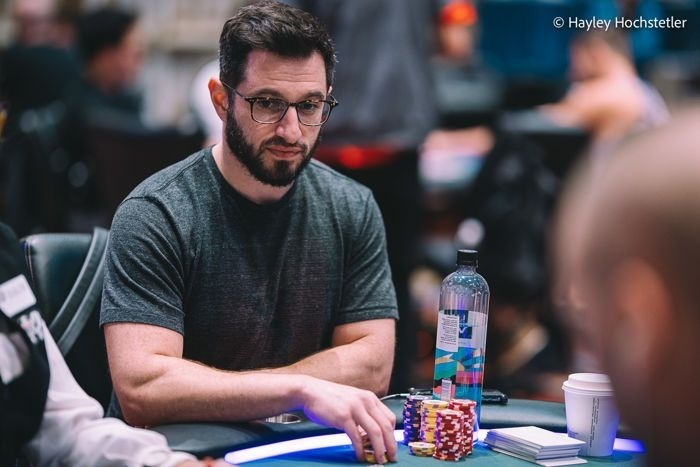
There was a time when I was a tired and frustrated poker player.
Few people know this story...
Feeling unlucky is something most players experience.
Here’s how I encountered and overcame that: ⬇️
Few people know this story...
Feeling unlucky is something most players experience.
Here’s how I encountered and overcame that: ⬇️
The feeling of being lucky (or unlucky) can have a big impact on your performance at the poker table.
Let me take you back to 2011.
I moved to Vancouver to play online Poker.
Let me take you back to 2011.
I moved to Vancouver to play online Poker.
I lived with a poker-playing friend for the first time.
We played from the same room, with our setups on opposite ends of a long table.
Prior to this, I never really reacted to “losses” at the poker table.
But that was soon about to change…
We played from the same room, with our setups on opposite ends of a long table.
Prior to this, I never really reacted to “losses” at the poker table.
But that was soon about to change…
One day my friend complained about a bad beat.
Then he did it again.
It didn’t take long until I started developing the same habit.
Every time either of us lost, we would complain about our luck.
All of the sudden, I was a complainer.
Then he did it again.
It didn’t take long until I started developing the same habit.
Every time either of us lost, we would complain about our luck.
All of the sudden, I was a complainer.
Rather than this being cathartic, I noticed a clear decline in my mood.
Now every time I took a bad beat, I was thrown off my game faster.
It’s a cycle:
Bad beat -> worse play -> more losses-> even worse play
Now every time I took a bad beat, I was thrown off my game faster.
It’s a cycle:
Bad beat -> worse play -> more losses-> even worse play
Most humans already deal with "negativity bias."
It’s basically when negative moments stick out in our memory more than positive ones.
By whining, I drew even more of my attention to the negative.
This negativity bias is not just exclusive to poker, it's everywhere...
It’s basically when negative moments stick out in our memory more than positive ones.
By whining, I drew even more of my attention to the negative.
This negativity bias is not just exclusive to poker, it's everywhere...
“Of COURSE traffic stops moving in this lane as soon as I switch.”
“Bad weather on the ONE day I needed it not to be. Just my luck!”
When all goes “as planned,” we don’t think about our positive luck.
But when something goes wrong unexpectedly, we remember it for a long time.
“Bad weather on the ONE day I needed it not to be. Just my luck!”
When all goes “as planned,” we don’t think about our positive luck.
But when something goes wrong unexpectedly, we remember it for a long time.
This can lead to a “bad things happen to me” mindset, which is detrimental to our mental and emotional well-being.
To combat this, I did these three things (and still do them today):
To combat this, I did these three things (and still do them today):
1. I acknowledge the good
Instead of complaining about the bad things, I make it a point to acknowledge when good things happen to me.
I still don't magically forget my bad luck but, because of this, I remember a lot of my “lucky” moments as well.
Instead of complaining about the bad things, I make it a point to acknowledge when good things happen to me.
I still don't magically forget my bad luck but, because of this, I remember a lot of my “lucky” moments as well.
2. I call myself a lucky person.
This helps me to be more positive & emotionally stable when things don’t go my way.
To be clear: I know I’m objectively fortunate.
But so are most people reading this. It doesn’t stop some of them from saying, “With MY luck, this will fail."
This helps me to be more positive & emotionally stable when things don’t go my way.
To be clear: I know I’m objectively fortunate.
But so are most people reading this. It doesn’t stop some of them from saying, “With MY luck, this will fail."
3. I uncover gratitude
Whether expressing it to others or simply acknowledging things in my life that I’m grateful for, actively acknowledging gratitude can work wonders on your mood.
Whether expressing it to others or simply acknowledging things in my life that I’m grateful for, actively acknowledging gratitude can work wonders on your mood.
All 3 of these practices remind me of all my good fortune, which is easier to take for granted & forget than the moments of bad luck.
This improves my ability to weather the storm, at and away from the poker table.
Complaining did the exact opposite.
This improves my ability to weather the storm, at and away from the poker table.
Complaining did the exact opposite.
I hope these suggestions can help you make the same improvements I did in my mental game!
Follow me @PhilGalfond as I’m gonna keep working on these threads!
If you found this helpful & think your poker friends might too, share by retweeting the 1st tweet of the thread:
Follow me @PhilGalfond as I’m gonna keep working on these threads!
If you found this helpful & think your poker friends might too, share by retweeting the 1st tweet of the thread:
https://twitter.com/PhilGalfond/status/1623097080498511880
• • •
Missing some Tweet in this thread? You can try to
force a refresh






